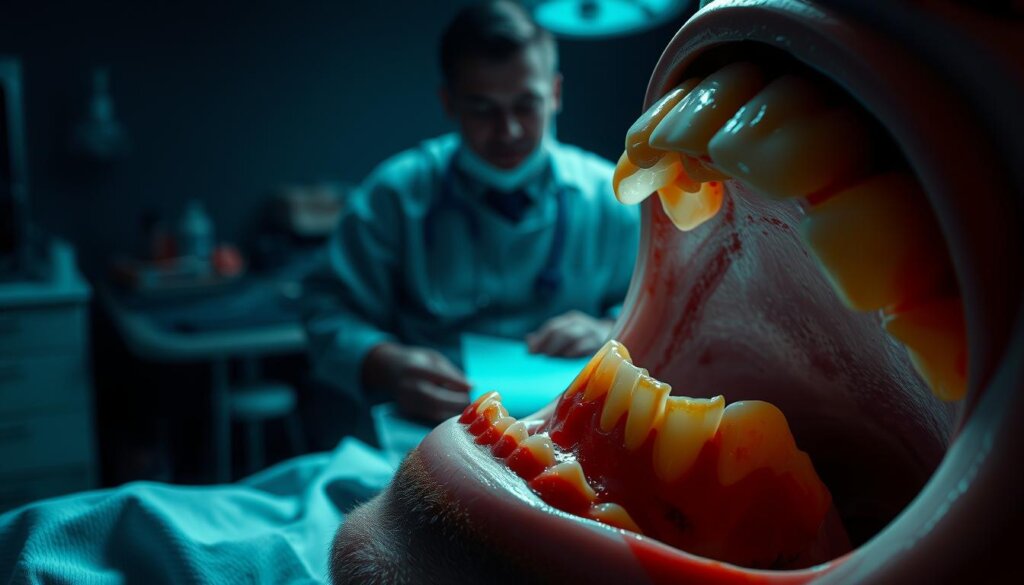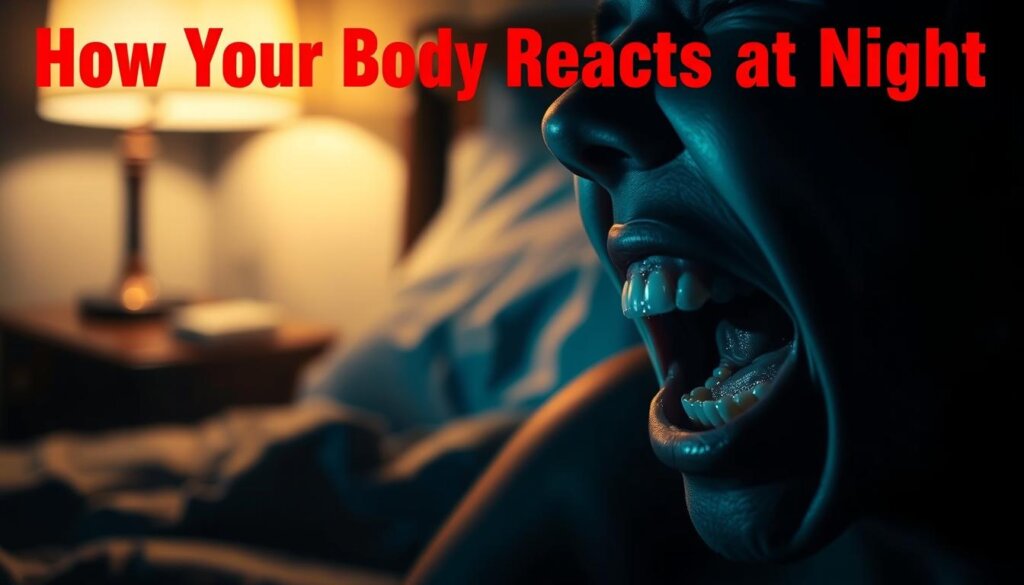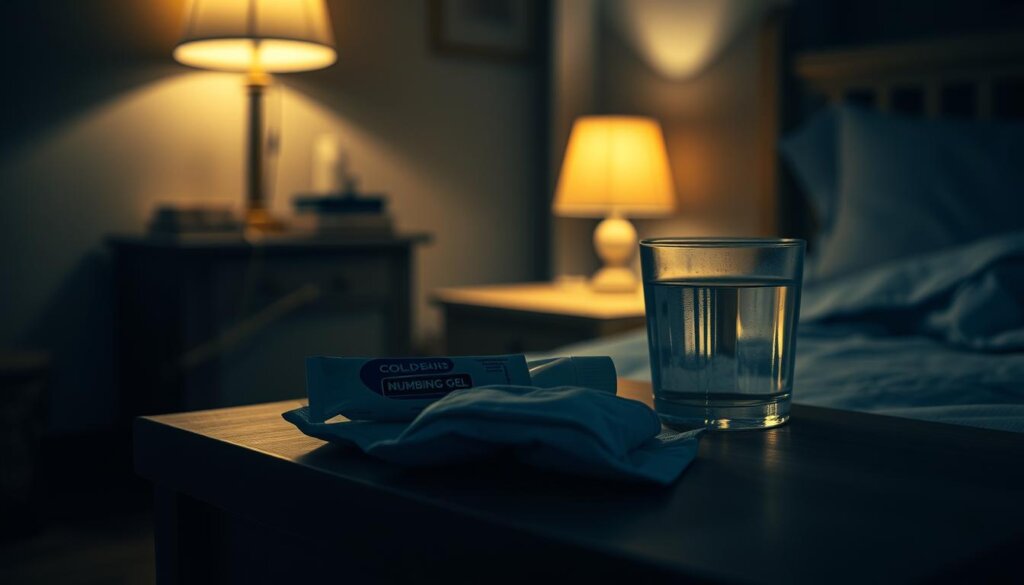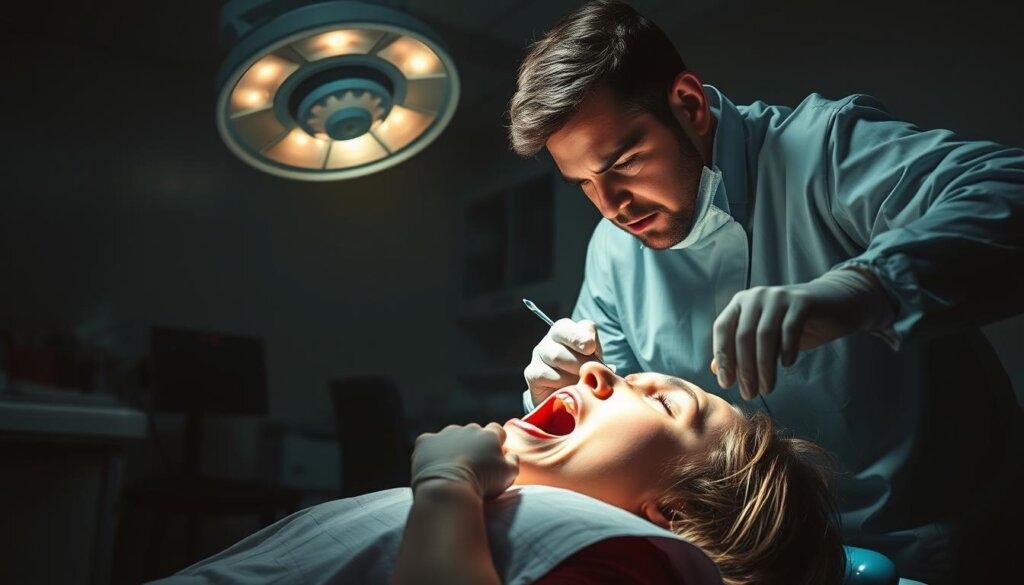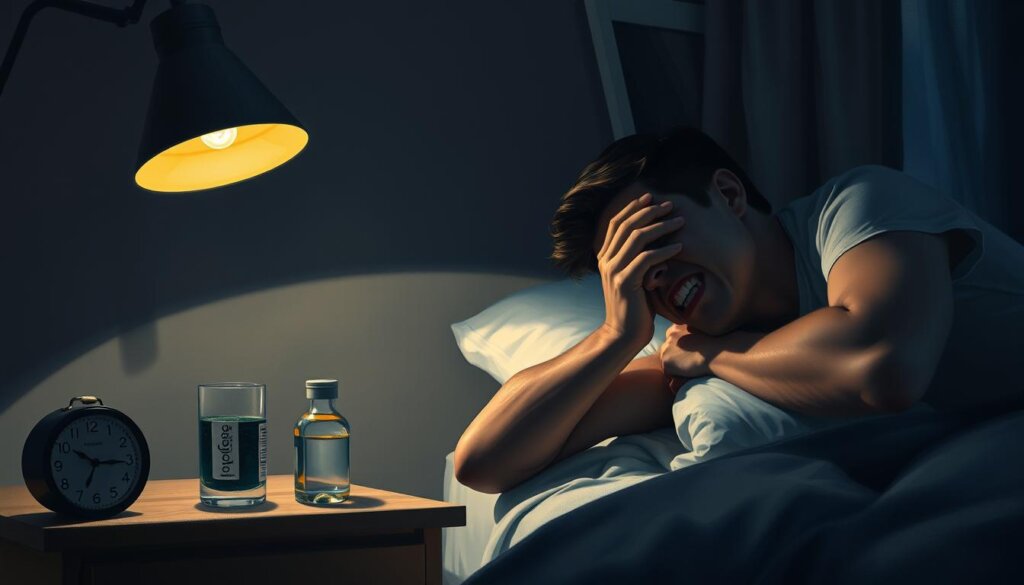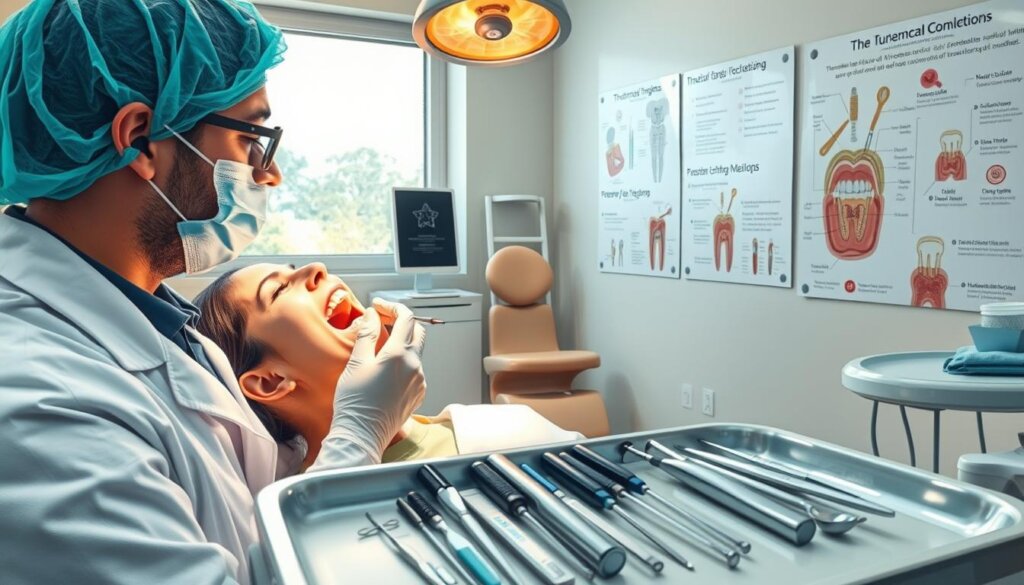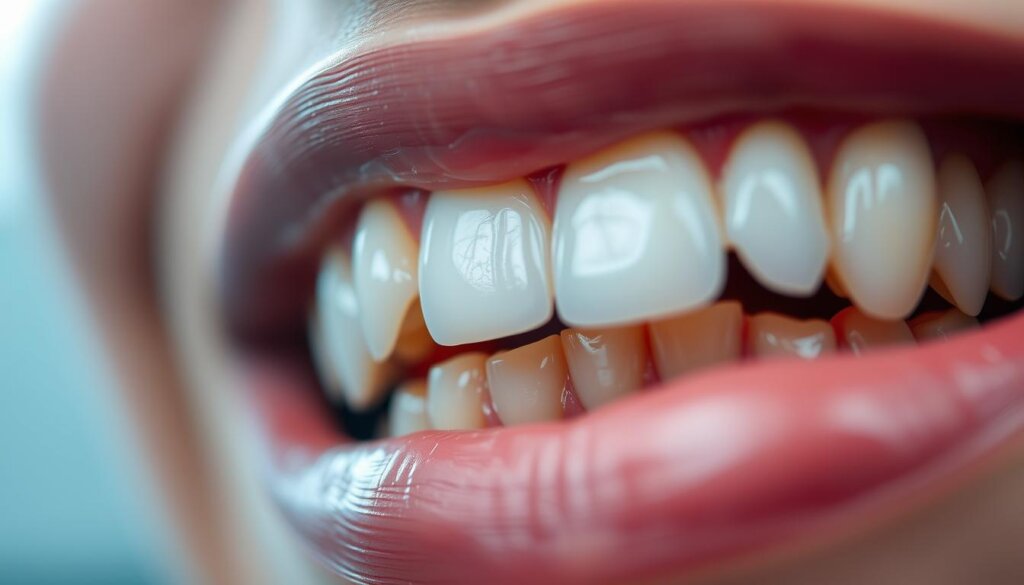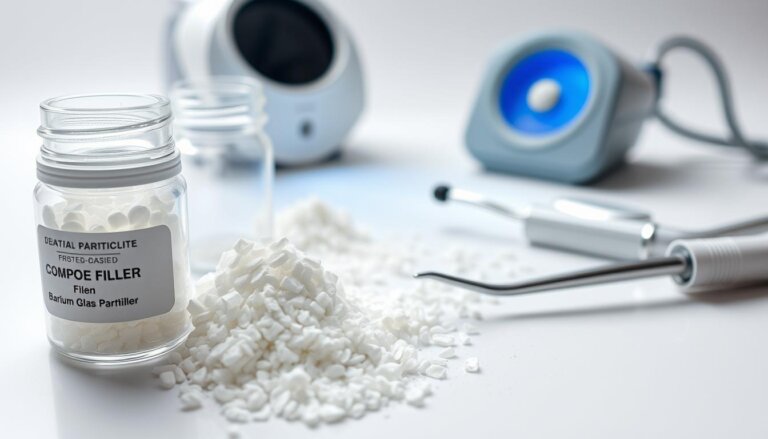Teeth Pain at Night: Why It Intensifies
Nearly half of all adults suffer from tooth pain at night. This type of pain can really mess with your sleep and how you feel overall. Finding out why tooth pain gets worse at night is important, not just for feeling better quickly. A lot of folks find their toothaches go from bad to worse at bedtime. They wonder why resting makes the pain shoot up.
The reasons include what you eat, how you live, and body changes when you sleep. Lying down makes more blood flow to your head, which can make the pain stronger. While there are quick fixes for tooth pain at night, they’re just temporary. If you don’t check in with a dentist, the problem could get much worse.
Key Takeaways
- Understanding why tooth pain worsens at night helps in dealing with it effectively.
- Nighttime toothache gets worse due to diet, lifestyle, and sleep-related body changes.
- Quick remedies help for a bit, but seeing a dentist is key for a real fix.
- More blood flow to the head when sleeping can make pain worse, making sleep setup important.
- If tooth pain at night keeps up, it’s time to see a dentist to find and fix the cause.
Common Causes of Nighttime Tooth Pain
Waking up in the night with severe tooth pain is common. It helps to know the causes of toothache at night to prevent this. Tooth pain often gets worse at night for various reasons.
Teeth grinding, also known as bruxism, is a big reason for night toothaches. Stress can make you grind your teeth more in your sleep. This causes a lot of wear on your teeth and makes them very sensitive.
Tooth decay and cavities hurt more at night. They come from bacteria and not cleaning your teeth well. Gum disease, like periodontitis, also makes your teeth hurt more. It makes your gums swell and can make you lose teeth if not treated. Lying down can make the pain worse because more blood gets to the sore areas.
Tooth sensitivity is another cause of pain at night. It happens, for example, if teeth touch very cold or hot foods or drinks before bed. The picture below shows more about these nocturnal toothache causes.
| Condition | Description | Common Symptoms |
|---|---|---|
| Bruxism | Clenching or grinding of teeth, often due to stress or anxiety | Headaches, jaw pain, worn tooth enamel |
| Tooth Decay and Cavities | Erosion of tooth enamel leading to holes in teeth | Sensitivity, sharp pain when eating or drinking |
| Gum Disease (Periodontitis) | Inflammation and infection of the gums that can lead to tooth loss | Swollen, red gums, bleeding, pain |
| Tooth Sensitivity | Discomfort or pain in teeth when encountering certain temperatures and substances | Sharp, temporary pain due to exposure to hot, cold, sweet, or acidic foods and drinks |
Tackling these issues can significantly reduce causes of toothache at night. This ensures a night without pain and full of rest.
How Your Body Reacts at Night
Knowing how your body responds at night helps explain nighttime dental discomfort reasons and why dental pain in the evening feels stronger. At night, without daytime distractions, we notice any discomfort much more.
At night, our body changes in ways that affect how we feel pain, especially concerning our teeth. These changes make dental discomfort seem worse at night:
- Decreased Distraction from Pain: Nighttime means fewer activities to keep us busy. So, we’re more in tune with our body, making even small dental issues feel much bigger.
- Changes in Blood Flow: Being horizontal changes our blood flow. More blood can end up in our head and neck, raising pressure in our sinuses and gums. This can make any tooth pain worse.
- Heightened Awareness of Symptoms: With less going on around us, we’re more aware of pain. This leads to feeling tooth pain more intensely at night.
Understanding this nighttime shift in our body’s workings is key to knowing why dental pain hits harder at night. Recognizing these changes helps us find better ways to deal with and prevent dental discomfort.
Lifestyle Factors That Contribute
Learning about the lifestyle choices that affect tooth sensitivity at night and how to manage tooth pain at night is key. These choices span from what we eat and drink to how we handle stress. They play a big role in our night-time mouth health.
Diet and Late-Night Snacking
Eating acidic or hard foods before bed can make tooth pain worse. This is due to enamel erosion or damage. Late-night snacks increase teeth’s exposure to sugars and acids. This can boost decay and sensitivity. It’s best to eat foods that are gentle on teeth at night. And always brush your teeth after snacking.
Caffeine and Alcohol Consumption
Having caffeine or alcohol before bed can lead to tooth sensitivity at night. Caffeine cuts down on saliva production. Saliva helps neutralize mouth acids. Alcohol dries out the mouth’s tissues, which can make pain feel worse.
Stress Levels
Too much stress can cause teeth grinding at night, known as bruxism. Bruxism is a big reason for tooth pain and sensitivity. Lowering stress through relaxation or getting professional help can decrease bruxism. This helps lessen pain and saves the enamel from too much wear.
| Factor | Impact on Dental Health |
|---|---|
| Diet and Snacking Habits | Increases acid exposure, promoting decay and sensitivity |
| Caffeine and Alcohol | Reduces saliva production and dries oral tissues, increasing sensitivity |
| Stress | Encourages bruxism, leading to higher risk of enamel wear and sensitivity |
Importance of Sleep Position
The way you sleep can greatly affect your dental health, especially with nighttime tooth pain. Making sure your head and neck are aligned right is key. Looking after pressure points and sinus health helps ease toothache. We’ll look at how minor changes to how you sleep can greatly ease pain and help you sleep well.
Impact of Head and Neck Alignment
Correct head and neck placement is key while sleeping. It supports your spine and eases tooth pain at night. Wrong placement can make jaw and neck muscles tense, making toothache worse. Using pillows that support your spine’s natural curve helps with better alignment and less pain.
Pressure Points on Teeth
Lying down changes how pressure is spread across your body, making tooth pain feel worse. This happens often if your face or jaws feel extra pressure. It’s good to keep an eye on how your head and jaw line up with your body. Side sleepers should try changing their position or use a softer pillow to lessen jaw pressure.
Elevated Sinus Problems
People with sinus issues may feel more tooth pain at night because of congestion. Propping your head up with an extra pillow can lessen this pressure. It also helps with sinus drainage, indirectly easing toothache. This way, breathing is easier, and sinus-caused tooth pain decreases.
Optimizing how you sleep can really help with tooth pain at night. It makes your sleep better, tackling tooth pain issues head-on.
How to Alleviate Tooth Pain at Night
Nighttime doesn’t just mean rest for some, it also means dealing with tooth pain. Knowing how to ease tooth pain at night is key to better sleep and wellbeing. Let’s look at what dental experts suggest to soothe this pain.
Over-the-Counter Pain Relievers are often a go-to solution. Medicines like ibuprofen, acetaminophen, and aspirin can lower inflammation and relieve pain quickly. Just make sure to follow the dosage instructions to stay safe.
Besides medicines, Natural Remedies and Home Solutions are important too. Check out these recommended home remedies for easing tooth pain at night:
| Remedy | Description | Application |
|---|---|---|
| Clove Oil | Anatural analgesic that numbs pain. | Apply a small amount directly to the affected tooth or gum area. |
| Salt Water Rinse | A simple anti-bacterial solution. | Rinse your mouth for 30 seconds before bedtime. |
| Peppermint Tea Bags | Slightly warm or cold can soothe sensitive gums. | Apply the tea bag to the troubled area after steeping. |
If you grind your teeth at night, known as bruxism, a Mouthguard could help. It protects against tooth damage and eases pain.
These methods can offer quick relief and are part of a good dental care plan for managing tooth pain at night. Always check with a doctor to make sure these solutions fit your health needs.
When to Seek Professional Help
If you’re having tooth pain all night, it’s time to consider seeing a dentist. Knowing when to go can be critical to handling tooth pain and keeping your mouth healthy. This is especially true for dental emergencies, which won’t get better without expert care.
- Persistent pain lasting more than two days
- Severe pain that disrupts sleep or daily activities
- Fever, swelling, or signs of infection around the tooth
- Difficulty opening the mouth or swallowing
Common Treatments for Nighttime Pain
Treatments change depending on what’s causing your toothache:
| Condition | Treatment |
|---|---|
| Cavities | Filling or crown to restore tooth structure |
| Gum Disease | Deep cleaning or medication |
| Cracked Tooth | Dental bonding or crown depending on severity |
| Sinus-Related Pain | Treatment of sinus condition and possible dental consult |
Preventive Care Strategies
- Maintain excellent oral hygiene with regular brushing and flossing
- Schedule regular dental check-ups and cleanings
- Avoid hard foods that may cause damage to your teeth during nighttime
Preventive care is key to managing and avoiding night tooth pain. Timely dental visits can stop serious conditions from developing. They can shield you from intense pain and expensive treatments.
Connection Between Teeth Pain and Other Conditions
Teeth pain during the night can point to more serious health problems. It’s not only about dental issues. Here, we’ll look at how sinus infections, TMJ disorders, and nerve issues can cause night toothache.
Many don’t know that a sinus infection might be behind their tooth pain. The sinuses sit close to the upper teeth. When inflamed, their pressure feels like a toothache. It’s vital to know this link to avoid unnecessary dental work.
Sinus Infections and Toothache
A sinus infection can press on teeth roots. This makes you feel like you have a bad toothache. Treating the sinus problem often stops this type of pain.
Jaw Disorders (TMJ)
TMJ is about issues with the jaw-to-skull joint. It can cause pain in your jaw, teeth, and ears. At night, some people grind their teeth, making it worse.
Nerve Pain and Dental Issues
Dental nerve pain, or pulpitis, also leads to night tooth pain. Pain gets bad at night because you’re lying down, which increases blood flow to the head. This condition needs careful checking and treatment.
Handling these issues well means understanding their causes. You need a good diagnosis and the right treatment plan. Dentists and doctors should work together for the best care.
The Role of Dental Hygiene
Keeping your teeth clean is key to preventing nighttime tooth pain and keeping your mouth healthy. A good oral hygiene routine stops pain before it starts. It also protects your mouth from infections and decay.
It’s important to know that not taking care of your teeth can lead to problems. These problems can get worse at night when you’re resting. That’s why doing things like brushing and flossing right is a big part of keeping your teeth healthy.
| Dental Practice | Benefits | Frequency |
|---|---|---|
| Brushing | Removes plaque, reduces tartar build-up | Twice a day |
| Flossing | Cleans hard-to-reach areas between teeth | Daily |
| Dental Check-Ups | Early detection and treatment of oral issues | Every 6 months |
Sticking to these habits shows how much importance of dental hygiene there is. It’s also crucial in preventing nighttime tooth pain. Brushing and flossing get rid of the stuff that causes tooth decay and gum disease. These are often what cause toothaches at night.
Going to the dentist regularly is super important. Dentists can spot and treat problems early. That way, you can avoid big issues and the pain that comes with them.
Adding good dental habits to your daily life isn’t just to stop the pain. It’s a way to make sure you have healthy teeth for a long time.
Understanding Tooth Sensitivity
Tooth sensitivity is a common issue that can get worse at night. Knowing why it happens and how to manage it can make a big difference. It helps to feel better and reduce discomfort.
What Causes Sensitivity? Various things like cavities, worn enamel, gum problems, and exposed roots can cause sensitivity at night. These issues expose a softer part of the tooth called dentin. Dentin has tiny tubes that lead to the tooth’s nerve, causing pain with certain triggers.
How to Manage Sensitivity To handle sensitivity, avoid hot or cold items and keep up with dental visits. Good oral care is key to preventing problems that make teeth sensitive.
- Using desensitizing toothpaste
- Avoiding acidic food and drinks
- Brushing with a soft-bristled brush
Products to Consider For nighttime tooth sensitivity, there are helpful products. Desensitizing toothpastes and mouthwashes block pain paths to the nerves in teeth.
| Product Type | Description | Use Case |
|---|---|---|
| Desensitizing Toothpaste | Contains compounds that help block transmission of sensation from the tooth surface to the nerve. | Recommended for daily use |
| Mouthwash | Formulated with fluoride to strengthen enamel and reduce painful sensations. | Use twice daily after brushing |
Understanding and using these tips can greatly lessen discomfort. It makes your night-time dental care better.
The Psychological Aspect
The psychological impact on tooth pain, especially at night, is really shaped by our feelings. Anxiety, for example, seriously affects how we feel pain. It’s important to know how our minds change pain perception at night to better manage night toothaches.
Anxiety can make tooth pain feel worse. It does this by making our senses sharper. This part explains how our minds make tooth pain worse. It also talks about ways to lessen the pain.
| Coping Mechanism | Description | Effectiveness |
|---|---|---|
| Mindfulness Meditation | Focusing on the present moment to reduce stress and anxiety. | High |
| Progressive Muscle Relaxation | Technique involving tightening and relaxing different muscle groups. | Medium to High |
| Cognitive Behavioral Therapy (CBT) | Structured psychotherapeutic treatment that helps in reframing negative thought patterns. | High |
Mindfulness and relaxation techniques can help you ignore the pain. This makes the psychological impact on tooth pain less severe. Using these methods at night can make the pain feel less intense.
Effects of Medication on Tooth Sensitivity
Understanding how meds affect tooth sensitivity is key for good oral health. Many prescribed and over-the-counter meds can make teeth more sensitive. This not only hurts but can also mess with how well dental treatments work.
It’s key for patients to talk about all meds they’re on with their dentists. This talk can help figure out if meds are making their teeth sensitive. Dentists can then help lessen these effects or suggest other treatments.
Common Medications That Can Affect Teeth
Some meds, like certain antihistamines, decongestants, and blood pressure meds, can make your mouth dry. Sadly, a dry mouth doesn’t just make teeth more sensitive. It also speeds up tooth decay, making things worse.
Discussing Side Effects with Your Dentist
Knowing about tooth sensitivity side effects is important for good dental care. When seeing a dentist, patients should talk about any side effects from their meds. Dentists can then change the dental care plan or give tips on dealing with dry mouth and sensitivity.
By being informed about how meds and oral health interact, people can act to reduce tooth sensitivity. This helps keep their teeth healthy.
The Role of Genetics in Dental Pain
Studying how our genes affect dental pain and sensitivity to teeth shows a deep link between our genetics and oral discomfort. By looking into family health history and new research, we often find common traits that make people more likely to experience dental issues.
Knowing the genetic roots of oral health problems changes how we prevent and treat them. Realizing the big role of genetics lets patients and doctors create better health plans. This means care can be more focused and proactive.
| Condition | Common in Family History | Potential Genetic Link | Impact on Pain Sensitivity |
|---|---|---|---|
| Tooth Decay | Yes | High | Increase |
| Gum Disease | Often | Moderate | Increase |
| Enamel Erosion | Sometimes | Low | Mild Increase |
Using genetics to understand dental health better highlights the need for an early and active approach to care. This is especially true for those more likely to have issues, like those with hereditary tooth sensitivity.
Customizing Your Oral Care Routine
To manage tooth pain at night, it’s key to have personalized dental care made for your bedtime needs. It’s important to choose the right products. And to make a nighttime oral hygiene routine that keeps your teeth healthy while you sleep.
When picking nighttime products, think about your issues like sensitive teeth or dry mouth. Look for toothpaste and mouthwashes made for these problems. They work harder at night to help you.
- Specialized toothpaste for sensitive teeth that provides relief and fortifies enamel overnight.
- Alcohol-free mouthwash that hydrates and soothes dry mouth, often worse during nighttime.
- Mouth guards that prevent teeth grinding and thus protect against further damage.
Creating a nighttime oral hygiene routine is also key. This should include brushing, flossing, and using medicated rinses if your dentist recommends them. Let’s break down a simple routine:
- Brush teeth well for at least two minutes with a soft brush and fluoride toothpaste.
- Floss to get rid of food and plaque between teeth, which can cause decay and sensitivity at night.
- End with a good mouthwash to kill germs and stop plaque buildup.
By using the right products in a good routine, personalized dental care meets your unique needs and nighttime challenges. This not only eases tooth pain at night. It also helps keep your teeth and gums healthy in the long run.
Myths and Misconceptions About Tooth Pain
Many people get toothaches wrong because of false info out there. Wrong beliefs can make pain worse and lead to more dental problems. We’re here to clear up those myths and show you what’s really true about tooth pain.
Myths about tooth pain can stop folks from taking good care of their teeth. People often get confused about what causes toothaches and how to treat them. This can make things worse. Let’s clear up some common myths and give you the facts to help you out.
| Myth | Fact | Impact of Misbelief |
|---|---|---|
| Aspirin placed directly on the gum relieves toothache. | Aspirin must be swallowed to relieve pain; placing it on the gum can cause tissue damage. | May lead to gum injuries which can compound the initial dental issue. |
| Tooth pain always means cavity. | Various issues, including gum disease, infection, or even sinus problems, can cause toothaches. | Ignoring different diagnostics might delay the appropriate treatment. |
| Improvement in pain means the problem is resolved. | Temporary pain relief might not indicate a resolved issue; underlying causes may still exist. | May cause individuals to postpone or avoid necessary dental check-ups. |
Understanding tooth pain correctly is super important. By debunking toothache myths, you learn the right steps to deal with tooth pain. Knowing the truth is the first step in keeping your mouth and overall health in check. It stops small problems from turning into big ones.
Tracking Your Symptoms
Many people feel tooth pain mostly at night. To handle this, it’s key to keep track of your toothache symptoms and find out what causes your tooth pain. Writing down your pain carefully helps point out what makes it worse. This way, you can get treatment that really fits your needs.
When you write in a pain diary, note every time your tooth hurts. Include what you were doing, eating, and how you were feeling. Write down when it happened, how long it lasted, how bad it was, and describe the pain. This detailed info is very useful for figuring things out.
| Date | Time | Intensity (1-10) | Duration | Possible Triggers |
|---|---|---|---|---|
| 12/01 | 10:00 PM | 7 | 2 hrs | Late dinner, Stress |
| 12/02 | 11:30 PM | 6 | 1.5 hrs | Cold drink, Watching TV |
| 12/03 | 9:45 PM | 8 | 3 hrs | Snack, Cold weather |
Tracking often shows patterns and common causes. For example, having cold or sweet drinks at night. Or feeling very stressed. By keeping track of your toothache symptoms, you can see what to change in your life. This helps lessen your pain. Or you can work with your dentist to treat it right.
Summary: Understanding Nighttime Tooth Pain
We’ve looked into why tooth pain gets worse at night. This covers how our bodies react, like noticing pain more when it’s quiet. It also looks at how lifestyle choices, such as what we eat and drink and how stressed we are, can make tooth pain worse.
To help with toothaches at night, it’s key to take care of your teeth, change how you sleep, and maybe use painkillers or natural treatments. It’s really important to make your dental care fit your needs. Going to the dentist regularly helps stop toothaches from getting worse.
Figuring out why you have tooth pain at night and knowing how to deal with it can make your life better. We’re committed to helping people understand how to take care of their teeth. This way, we can reduce tooth pain and help everyone have better dental health.

